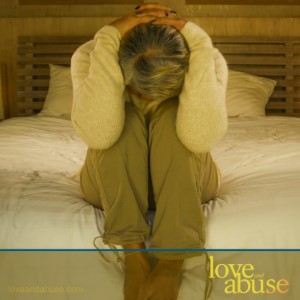
It can be hard to draw a line in a toxic relationship. Don’t make your emotional resilience a prison of your own making.
Your personal boundaries are there for a reason. Often, the only way things will change is if you change things because, quite often, the other person will do nothing at all.
Someone wrote to me and said, “I need help. I’m two years into this relationship that was started on the foundation of healing and redeeming abuse from another stint five years ago.
“He fell back into his old habits pretty quickly. It boils down to refusing accountability and blaming me and my ‘approach.‘ He acknowledged his abusive behavior toward me and even joined a program for it for a short time. He asked for my help and insight to change himself. I swear he was genuine in his declarations of stopping the violence, but there was always some kind of caveat that placed blame on me for his behaviors.
“Some time into the relationship, after being spat on, cheated on, lied to, called horrid names, my things broken, I started to react in emotionally violent ways myself. This, of course, has given him fuel to accuse me of being abusive, and he has doubled down on refusing accountability because of it. I had done so much research into this.
“Your podcast has been a great resource as well. I see how my behavior has caused more conflict and also how it could be described as abusive. I want to be personally responsible for myself without enabling him to feed his narrative of pure victimhood.
“There’s so much more to everything, and I’m losing my mind trying to find help and sort it all out. Resources all point to abandoning the whole thing, but I see how both of our stories coexist in objective reality, and that’s where the resolution could live, right?”
Thank you for reaching out and sharing your experience. I’ll reply to you as if I’m talking directly to you while also addressing anyone else who might be reading this.
I’m truly sorry to hear about the struggles you’re facing. It’s clear you’re dealing with a lot, and it’s important to address a few key points from your message.
Firstly, you mentioned that he quickly reverted to his old habits. This is a critical moment in any relationship. Although it seems that moment has passed, it’s essential for anyone in a similar situation to recognize this as a turning point. When the familiar patterns of emotional abuse begin to surface again, it’s a strong indicator of what’s to come.
It’s difficult for me to soften this reality:
If you’re witnessing the same toxic behaviors that you’ve seen in the past, they are likely to persist.
Healing is a transformative process, and those who have genuinely healed will not continue to exhibit the same harmful behaviors. On the other hand, someone who hasn’t healed, who hasn’t taken time for self-reflection or sought therapy, is prone to repeat their past actions. When these behaviors re-emerge, it’s unrealistic to view them as temporary or to hold onto hope that they will cease without significant change. It’s crucial to acknowledge this as a representation of their current state.
I appreciate the person who wrote this for providing a cautionary tale that could help others recognize these warning signs. If you see old patterns resurfacing, it’s imperative to confront them immediately. You can call out the behavior by saying, “This is exactly what you did before, and it must stop now.”
Alternatively, you might decide that the best course of action is to remove yourself from the situation entirely by saying, “I don’t want to be here if this behavior continues, so I’m leaving.” It might seem drastic, but setting such a boundary could be necessary to convey that the behavior is unacceptable.
There are various ways to address this issue, but the key is to act swiftly and decisively when you recognize the signs of emotional abuse. Your well-being and safety should always be a priority.

It’s crucial to acknowledge the significance of your self-worth in these situations. As I read through the message from this person, a recurring theme stands out: they were mistreated, yet the relationship persisted.
The list of transgressions is severe—betrayal, deceit, and even physical disrespect. Despite these egregious acts, the person stayed, likely attempting to set boundaries, but to no avail.
Understanding and establishing your personal limits is paramount. Without clearly defined boundaries, the potential for harm is literally boundless.
The trap many fall into is the hope that an abusive person will change—that the person will see the pain they’re causing and reform their ways. However, when someone witnesses your suffering and continues their harmful behavior, it’s evidence that the cycle won’t break on its own.
Defining your limits is a form of self-care. It’s about stating, “I will not tolerate being cheated on,” or “I will not tolerate being lied to.” Without these declarations, abusive relationships can continue indefinitely, with your tolerance and resilience inadvertently becoming tools for enduring more abuse.
Resilience and tolerance are commendable qualities in almost every situation, but you need to be careful of those who exploit them so that they can be abusive toward you.
Love often complicates these dynamics, especially in our romantic relationships. We cling to the memory of the good times, the glimpses of kindness, and the person we once knew, hoping they’ll resurface and the abuse will cease. This hope can lead to increased tolerance, as we convince ourselves that the person we care about will realize the pain they’re causing and change. Or we may even start to believe we are the problem and that, by improving ourselves, the abuse will stop.
You should never have to modify yourself to prevent someone else’s abusive behavior.
Recognizing and adhering to your boundaries is not just about walking away from what’s harmful; it’s about walking toward respect for yourself and your well-being.
Reaching the point where you feel things couldn’t possibly get worse is a profound moment of truth. It’s a time when you’re forced to pause and take a hard look at your life. You must ask yourself, what is it that I truly want?
If we’re talking about romantic relationships, consider what qualities and behaviors you desire in a partner. I know some people reading this right now might realize they’re not receiving what they need from their significant other. Moreover, they may be reluctant to make changes that could potentially lead to a more fulfilling partnership. This could be due to a variety of reasons—financial constraints, children, shared commitments, or even working together.
This is where introspection becomes essential. Reflect on what you’re currently accepting and tolerating in your life. Then, ask yourself what you actually want in a partner or from any family member who might be causing you pain.
When you recognize that the other person is not providing what you need, you’re faced with the tough question of whether you’re in a no-win situation. Admitting that things may never improve, no matter how long you stay, is an important reality check for your overall health and well-being.
If you haven’t previously established criteria for what you will and won’t accept—your boundaries—then now is the time to start. For instance, you might decide that you will no longer tolerate lies in your relationship. Even if you’ve been dealing with dishonesty for years, it’s never too late to assert this boundary.
The challenging part comes next: determining the consequences if the lying continues.
Leaving an unhealthy situation isn’t easy, and I understand that. There may be those who rationalize the behavior, thinking it’s only a few lies or a single incident. But if the hurtful behavior persists and you’re striving to work through it, you must consider whether the other person is also making an effort to change their actions.
Returning to the individual who reached out and sent me that email, I want to address their concern that they are contributing to the problem by engaging in what appears to be reactive abuse.

If you’re unfamiliar, reactive abuse occurs when you feel you have no option but to respond abusively to be heard or understood. It’s as if the other person doesn’t comprehend any other language until you react similarly. While I don’t advocate for this, it’s a reality that sometimes, after enduring abuse for so long, you reach a breaking point and demand it to stop.
Assertiveness sometimes becomes our last resort to make our voices heard. This level of assertion might be perceived as reactive abuse. Yes, it can take on an abusive tone, but there’s a critical distinction to be made between someone who is actively emotionally abusive and someone who is reactively so.
An actively abusive person seeks to control and change you, insisting on having things their way without regard for your pain. This is the crux of many abusive behaviors. On the other hand, someone who is reactively abusive is striving to be heard and understood. They want to make positive changes for the other person and do the right thing, but when all attempts fail, they may feel like there is no other way to be heard or understood unless they redirect that abusive energy back toward the abuser as if it’s the only language an abuser understands.
While I’m not fond of the term “reactive abuse,” at times, there seems to be no other way to communicate effectively except by becoming so assertive, perhaps even aggressive, that the message finally lands or the behavior stops because it isn’t acknowledged in any other way.
In a typical, healthy relationship, communication doesn’t require such extremes. However, it appears the only way some will pay attention is if the communication is forceful or even emotionally charged. This leads to a cycle where both individuals engage in hurtful behaviors just to be heard or to express their emotions, but it’s a dead-end street where everyone ends up feeling wounded. The person who resorts to reactive abuse might feel heard for once and thus continue this pattern.
As the individual reaching out has realized, they’re trying to make sense of it all, contemplating whether to walk away because they see both parties are contributing to the dysfunction. The question then becomes, is the solution somewhere in the middle? It lies within you and within the other person.
This brings me to a philosophy I’ve adopted:
If I have a problem with someone I care about, that’s my problem, not theirs.
To this day, that’s a principle I live by. If I’m facing an issue with my partner, it’s my issue to address, not hers. This is an acknowledgment that I need to take responsibility for my own actions. In other words, rather than attempting to change or control my partner, I should remind myself that if I have a problem with her, it’s my issue to resolve.
This compels me to introspect and question whether I want to permit certain behaviors in my life. If I’m unhappy with her yelling at me and I feel I’m constantly being criticized, then I need to decide if that’s something I’m willing to accept.
It’s not about coercing her to change; it’s about expressing my boundaries clearly. I might say, “I can’t be around you when you behave like this.” It’s a possible response to establish where I stand. Another response might be, “I can’t be near you if you continue to blame me for everything. I don’t feel loved or respected, and it doesn’t seem like an equal partnership. I’m left feeling like nothing I do is right.”
Perhaps that’s the reality in her eyes! And if so, why am I sticking around? Why am I tolerating this? Even if there’s truth to her perspective, it’s not kind to constantly hear about my shortcomings and how I’m damaging our relationship.
This doesn’t make me feel loved or supported; it doesn’t feel like we’re equals working together. Instead, it makes me feel inferior, and if my partner is always highlighting my faults, I have to ask myself why I’m still here.
This realization leads me back to the idea that if I have a problem with her, it’s my problem, and I have to deal with it. My “problem” is that I don’t want to be called names, to feel unloved, unsupported, or like a loser. I don’t want to feel pressured to change who I am. I want to be accepted for who I am.
Since I dislike all these things, it’s up to me to take action. It’s not about her; it’s about me. I can tell her that while she may feel justified in her thoughts, I don’t want to be with someone who views me negatively and isn’t willing to work on things together.
I refuse to be with someone who sees my unhappiness and is indifferent to it. I choose not to be in such a situation. I’m going to prioritize my well-being. I realize it sounds like I’m envisioning a perfect world where it’s easy to stand up for oneself and establish boundaries, but adopting this mindset is vital.
It’s about beginning to think this way and moving in that direction. That’s what I want to convey to this person. You’ve allowed your boundaries to be crossed repeatedly, and I suspect you haven’t clearly defined them. If you had, you wouldn’t be asking these questions because you’d already have a course of action in mind. You would know your limits, and that’s something only you can determine. I can’t define your limits for you.
When people tell me they’ve been hurt or wronged, it’s clear enough. But understanding and setting your own boundaries is a deeply personal journey. Enduring even one of those behaviors would be intolerable for many people, and they would have left already.
Our personal limits dictate our responses. When we recognize that a situation is unlikely to change, acceptance becomes necessary. Accepting the unlikelihood of change allows us to make informed decisions moving forward.
Regarding the dynamics between two people in conflict, if one person changes their behavior, it does not guarantee the other will follow suit. Typically, if one person’s negative behavior prompted a reactive response from the other, it’s likely that the original behavior will persist regardless of changes made by the reactive party. This cycle of reactive abuse and entrenched behaviors can be difficult to break.
Focusing on yourself is essential. It’s not about changing the other person but about understanding and respecting our own boundaries and limits. If we find certain behaviors unacceptable, we must decide how to address them or whether we can live with them. Staying in a relationship that constantly belittles and hurts us is a choice that requires a hard look at what we are willing to accept.
If you’re in a situation where leaving isn’t an immediate option, acceptance of the other person’s unwillingness to change is crucial. This acceptance should guide every decision going forward. Hoping for change and basing actions on potential future behaviors only prolongs the cycle of abuse.
The most profound transformations I’ve seen in these dynamics occur when one person chooses to prioritize their well-being and asks themselves what they’re willing to endure. Shifting focus from changing the other person to self-reflection breaks the cycle of toxicity and promotes personal growth.
In a healthy relationship, mutual effort can resolve issues. However, in an emotionally abusive relationship, profound changes are often required, typically involving a journey of self-healing and discovery. This journey helps reconnect with the person you were before the relationship and can be crucial for moving forward.
When involved with someone who has a significant influence on you, it can create a mental and emotional fog, making it challenging to think clearly. This fog can persist for months after leaving an emotionally abusive relationship, especially if a trauma bond has formed. While physically separated, the mind may still be entangled with the abuser, clouding judgment.
The fog doesn’t lift if the abuse continues, preventing clear thought and decision-making. Sometimes, separation and self-focus are necessary to gain clarity and determine whether a return to the relationship is desirable.
It’s important to acknowledge that everyone’s circumstances are unique, and separation isn’t a viable option for everyone. However, through my decade of experience working with couples, I’ve observed that when they take some time apart, clarity often emerges as the emotional fog dissipates.
Although some emotional baggage may linger and attachments remain, a clearer sense of self can develop. When you’re not as influenced—or not influenced at all—by your partner, you’re in a better position to make sound decisions. This newfound clarity is where you can find inner peace and the ability to assertively declare what behaviors you will no longer tolerate.
Remaining in the toxic environment of an emotionally abusive relationship can prevent you from reaching the point where you recognize and enforce your limits. However, if you can define your threshold while still in the relationship, regardless of past events, you’ll notice your thought processes start to shift.
What once seemed impossible becomes attainable. It requires strength, courage, and the conviction that you will get through this. It’s about tapping into your inner resources, which can become obscured when someone chips away at your core identity.
I don’t wish for anyone to experience the erosion of their essence. If this has happened to you, know that it’s possible to reclaim and stay true to yourself.
I hope this message is helpful. Remember, no one deserves to go through what you’ve endured. If you wouldn’t stand for someone else being treated this way, you shouldn’t accept it for yourself, either.